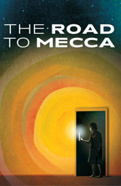The Road to Mecca Director Gordon Edelstein on Collaborating With 'Gracious and Generous' Playwright Athol Fugard
About the Author:
Gordon Edelstein has directed acclaimed productions on Broadway (The Homecoming), off-Broadway (Some Americans Abroad) and at the Long Wharf Theatre (The Glass Menagerie), where he has served as artistic director for the past 10 seasons. Edelstein is currently helming Roundabout Theatre Company's Broadway premiere of Athol Fugard's 1987 drama The Road to Mecca, starring Tony winners Rosemary Harris and Jim Dale and TV and movie regular Carla Gugino. This isn't the first time Edelstein has collaborated with the great South African chronicler of Apartheid: At the Long Wharf, Edelstein directed the world premieres of Fugard's Coming Home and Have You Seen Us?, as well as The Train Driver. Below, he recounts his extraordinary partnership with the celebrated playwright and recalls their first meeting, when Edelstein was just “another young director.”
![]()
The first Athol Fugard play I directed was a regional production of A Lesson From Aloes in the late ’70s. It’s such a beautiful play, and as soon as I started working on it, I immediately felt a sense of kinship with the work. Even as a young director, I felt tremendous simpatico to the soul of the world of South Africa while working on A Lesson From Aloes. Over the years I directed quite a few of Athol’s plays before I came to know him personally.
I met Athol once in the 1980s, which he wouldn’t remember, and why would he? At the time, I was just another young director who was a fan of his. I was directing a production of The Road to Mecca, ironically enough, at the Berkshire Theatre Festival in Stockbridge, Massachusetts. I approached Athol at a Theatre Communications Group conference and asked if he would be willing to meet with me and discuss the play. He did, and he was so gracious and generous.
Athol’s plays combine so many of the things that fascinate me most in the theater. The work I’m most attracted to combines the deeply personal with the social in a greater context. In nearly every one of Athol’s plays, there is a transformative relationship between the personal and the universal. He writes very honestly—not glibly, not superficially. He burrows deep into the human psyche and the human experience, and I find his work to be deeply moving and humane. He doesn’t write easy jokes or easy entertainments, although of course, his plays are quite compelling. He’s certainly not a commercial playwright in the traditional sense. He’s had very few plays on Broadway, and although it had a run off-Broadway in 1988, this is the first time The Road to Mecca has been on Broadway.
Usually, when Athol and I prepare to work on a play, I visit him in San Diego. We read the play out loud together, or he reads it out loud to me by himself, and we stop constantly to ask questions, probe deeper, or make jokes. When we are working on a new script, some of these dialogues result in script changes. The process usually takes two or three days. We discuss different moments of the play, and issues that arise based on whatever comes to me, the questions I have or the insights he wants to tell me. Sometimes I tape those conversations, sometimes I take notes, and sometimes I do both. It’s so inspirational to be around Athol. He brings a very practical insight to the process because he’s a practical man of the theater. Together we’ve developed a deep level of trust and understanding.
Athol will have four major New York productions this season, including two (Blood Knot and The Train Driver) that he is directing himself. I can’t even begin to imagine what that’s like for him. He is 80—a very energetic 80, but still 80. And yet he’s very fertile in his work. He’s written at least a play a year over the past few years, and we’ve done several of them at Long Wharf Theatre. He very well may have 10 more years of playwriting ahead of him. He’s much closer in age now to Helen Martins, the lead character of The Road to Mecca, than he was when he wrote it, and it’s an extraordinary thing for him to come back and see this play he wrote so long ago that was so personal. Helen is an artist who is something of an outsider in her society, who is facing the end of her life. The Road to Mecca is one of Athol’s most beautiful plays, and it’s a fitting moment to do this work as Athol marks his 80th birthday.
